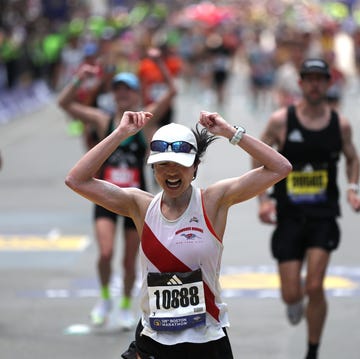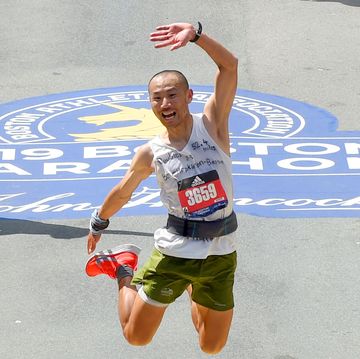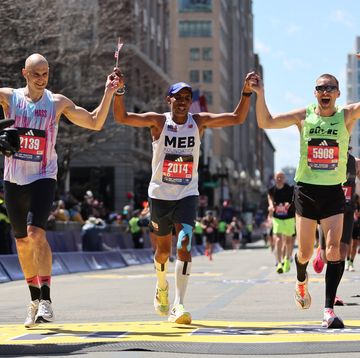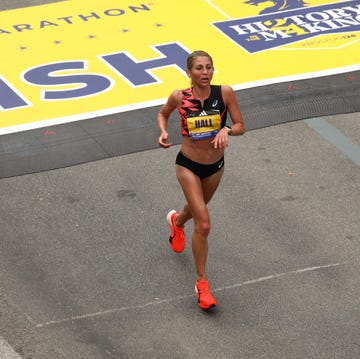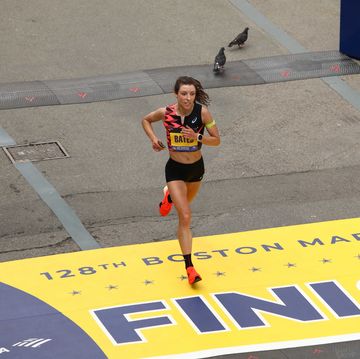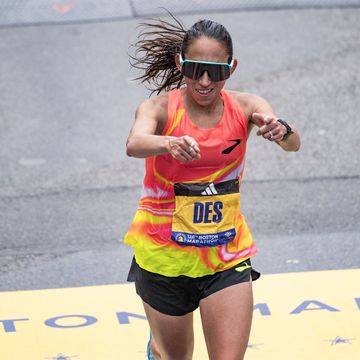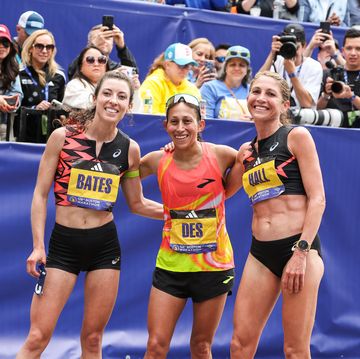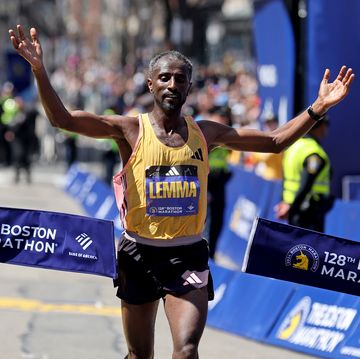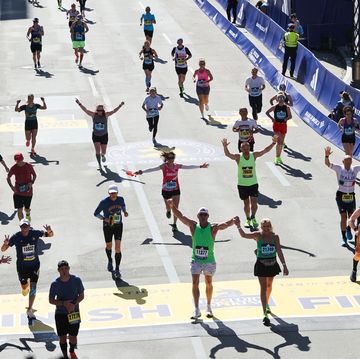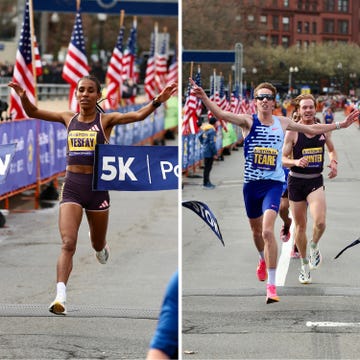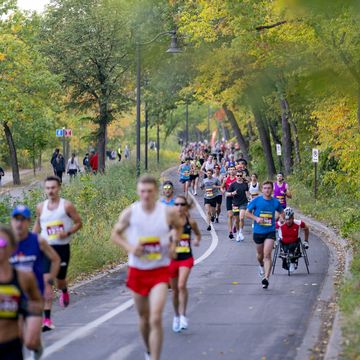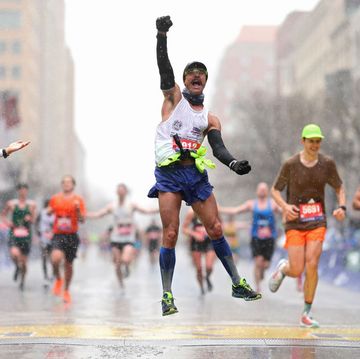Twenty-year-old Dartmouth junior Abbey D’Agostino had a busy 2012. After recording a huge 5000-meter PR at the Mt. SAC Relays last April, she won the NCAA title in the 5000m, then qualified for the Olympic Trials finals in the event. There she came up just .21 seconds short of qualifying for the London Games, finishing fifth overall in a photo finish for the third and final spot. In the process, she again lowered her PR, to 15:19.98. After struggling with a hip injury early in the fall, D’Agostino returned to form quickly, placing second at the NCAA cross country championship last November.
Today, D’Agostino was introduced as one of the headliners for this year’s Millrose Games, slated for February 16 at the Armory in Manhattan. In the indoor track season’s early stages, she has the fastest mile time in the world this year, 4:34.15, which she ran in a solo effort at the Dartmouth Relays on January 13. She’s coached by Mark Coogan, who was on the U.S. marathon team at the 1996 Olympics.
Let’s start with the biggest news at the moment, being announced as one of the elites for this year’s Millrose Mile. How big of a surprise was that?
Abbey D’Agostino: Huge surprise. I had no idea there were invitations for the elite mile. I knew it was a very prestigious, competitive event, but had no idea how it worked. I’m pumped. And to hear that I’ll be in the mix with possibly Brenda Martinez, and some other elites I’ve never gotten to run with before, and some other NCAA runners, too … It sounds like it’s going to be a high-energy event. And Mark and I will get to take the train. It’ll be fun.
You’ve made your mark this last year in the 5000 and cross country. Do you feel comfortable dropping down to a mile this early in the season?
AD: Yeah. Mark and I had talked about taking it down distance-wise throughout the indoor season. That’s what we did last year, for the most part. It’s just great training to get in that speed work. There’s a huge tactical element in the mile that’s not there to the same degree in the 3000, so that’s good practice, too. It’s a different race, but [it] will definitely be advantageous when Nationals comes and I’ll be shooting to run the 3-K, most likely.
I think it’s interesting that now you’re a name an event like Millrose will use in its publicity, but a year ago at this time you were known only in the college track and field circles. How does it feel going from a solid runner to an athlete an event is going to be putting up on the marquee?
AD: With these performances comes greater pressure. I’m definitely aware of that. But it’s something Mark has encouraged me not to focus on. I’d hate for that to influence how I run. I enjoy the sport, and never want it to feel like a burden. As long as I treat it like any other race, and run it for the same reasons, that won’t negatively impact my performances.
People throw the word “unheralded” around a lot when an athlete suddenly busts onto the scene like you did, but you were pretty unknown coming out of high school in Massachusetts and Coach Coogan was not yet in place. Was blending academics and athletics the top reason you ended up at Dartmouth?
AD: It definitely looked like an opportunity to combine the two so that I could prioritize both and do well in both at the same time. I was looking for a Division I team, but I felt that the Dartmouth team, without the competitive nature of scholarships and that sort of dynamic, that’s what I was looking for. I couldn’t really ask for a better [school] academically, and I’m surrounded by people who take the sport just as seriously as I do, but it’s also a fun and encouraging atmosphere.
2011 was a really good year, highlighted by getting third at the NCAA cross country championships. But it really seems like running 15:23 at Mt. SAC last year was your coming out party. What had you done that made you and Coogan believe you were ready to make the leap from elite college runner to Olympic Trials contender?
AD: I didn’t have my sights set on [making the Trials] at the beginning of last year. It was really Mark – I trust him incredibly with workouts and what I’m capable of. He has this incredible knack for being realistic of what I’m capable of doing, and he’ll tell us a certain workout translates to a certain time, and come the end of the season that’s what happens.
As we began to talk about [the Trials] late in the cross country season, I began to set it as one of my personal long-term goals. I trained a lot and got a lot of support and encouragement from my teammate Alexi [Pappas], who’s now at Oregon, and she started thinking the same way about going to the Trials. It was a mutual goal and we made it one that was both hard and fun. Definitely something I hadn’t imagined in my wildest dreams, but when we were there, we felt as though we belonged and we were going to give it our best shot.
You followed up that fantastic Mt. SAC time with an NCAA title in the 5000. Is that when you realized you could be a legitimate contender at the Trials?
AD: Mt. SAC was actually more of a milestone for me, being in that field, because we were with the professionals. The time was a lot faster than what I’d run in the past. So to be an NCAA champion was amazing, absolutely, but I think I had a lot more confidence going in there than I did before Mt. SAC. At the end of the race at Mt. SAC, I was in shock. I’d been thinking, let’s get in there and run fast and hang on, [whereas] at Nationals my attitude was one of greater confidence.
During the television broadcast of the Olympic trials final, commentator Craig Masback mentioned that Coogan’s sole goal for you was to relax and enjoy the experience. Were you able to do that?
AD: Oh, that made the difference for me, knowing that the pressure was off. I felt I was unique in that sense in the preliminary round. There were other collegiate runners, yes, but for the most part for those shooting to make the team, that preliminary round was a huge deal. One of the Dartmouth alumni who had been to the Trials before kept reiterating that when I get out onto Hayward Field, and it’s a few minutes before my race, take it all in and appreciate it. He said, “Nothing is ever a guarantee. You never know if you’ll be back here again.” So I did that and felt more relaxed than I had ever felt before a race. I think seeing it as an opportunity rather than an intimidating field and set of competitions, I was able to treat it just like any other race.
Given that relaxed attitude, were you cognizant at all of whether you were on Olympic “A” standard pace [15:20]?
AD: I had no idea. I thought that it was faster than the prelims, but I had absolutely no idea how close it was. We were hoping it would go out an honest pace because I knew I didn’t have the time, but I think that was the last thing on my mind. And it couldn’t have been any closer.
You seem to gravitate to photo finishes, not only at the trials but also at this year’s NCAA cross country championship in your battle against Jordan Hasay. That said, were you happy with second place at NCAAs given the long track season?
AD: I definitely was. It was sort of a rollercoaster season given the [hip] injury I was dealing with. Mark and I had a good plan going into Nationals, and I think we eased back into the mileage. That ended up working well. To be back out there and feeling like myself again at Nationals was incredible. I just felt so fortunate. It’s different, being at an Ivy League school and not having the opportunity to redshirt as readily as some other Division I schools.
One of the most exciting things about being so early in your elite career is this tremendous growth curve, where every race seems to net a huge PR or new major accomplishment. Have you and Coach Coogan planned for how you’ll adjust when the times don’t drop quite so easily?
AD: Like you said, it comes with the territory. Now that I have more experience running in more competitive fields, my expectations will change and become ones that are more realistic. I don’t think that will affect me, despite the reality that the PRs maybe won’t be 20 seconds anymore. I think it is all relative. I’m just happy to be able to compete at this level while still in college. Really, I feel as though I’m gaining from the experience, regardless of its quantitative meaning.
And it’s fun to travel. All these new opportunities are really great.
Lastly, I know you said you look back and have no regrets, but was there any take-home message Coach Coogan had for you after cross country or the Olympic trials?
AD: A big lesson that came out of the fall was the importance of patience. I think the whole experience [getting injured], it could have been a lot worse. It definitely could have been. It was humbling. It came on fast, we weren’t sure how it happened, it was frustrating, but we were patient and did everything we knew how to do. I knew we hadn’t done the same caliber of workouts under normal circumstances, but he kept saying, “You’re the same runner. You’ve done this before.” That’s really the take-home point for this season and really what I’ve always leaned on in the face of anxiety or nerves.


